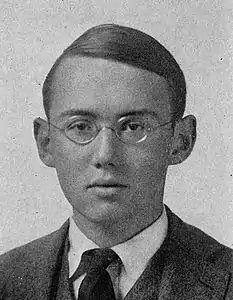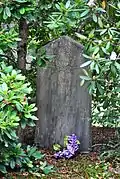Stephen Vincent Benét
Stephen Vincent Benét /bɪˈneɪ/ (July 22, 1898 – March 13, 1943) was an American poet, short story writer, and novelist. He is best known for his book-length narrative poem of the American Civil War, John Brown's Body (1928), for which he received the Pulitzer Prize for Poetry, and for the short stories "The Devil and Daniel Webster" (1936) and "By the Waters of Babylon" (1937). In 2009, The Library of America selected his story "The King of the Cats" (1929) for inclusion in its two-century retrospective of American Fantastic Tales edited by Peter Straub.
Stephen Vincent Benét | |
|---|---|
 Stephen Vincent Benét, Yale College B.A., 1919 | |
| Born | July 22, 1898 Bethlehem, Pennsylvania |
| Died | March 13, 1943 (aged 44) New York City |
| Occupation | Writer |
| Nationality | American |
| Alma mater | Yale University |
| Period | 20th century |
| Genre | Poetry, short story, novel |
| Notable works | John Brown's Body (1929) The Devil and Daniel Webster (1936) By the Waters of Babylon (1937) Seven Brides for Seven Brothers (1954) (adapted from Benét's story The Sobbin' Women) |
| Notable awards | Pulitzer Prize for Poetry (1929) O. Henry Award (1937) Pulitzer Prize for Poetry (1944, posthumous) |
| Spouse | Rosemary Carr (m. 1921) |
| Children | Thomas, Stephanie, and Rachel |
| Relatives | William Rose Benét (brother) Laura Benét (sister) |
Life and career
Early life
Benét was born in Bethlehem, Pennsylvania to James Walker Benét, a colonel in the United States Army. His grandfather and namesake led the Army Ordnance Corps from 1874 to 1891 as a brigadier general and served in the Civil War. His paternal uncle Laurence Vincent Benét was an ensign in the United States Navy during the Spanish–American War and later manufactured the French-Hotchkiss machine gun.[1]
At around the age of ten, Benét was sent to the Hitchcock Military Academy. He graduated from Summerville Academy in Augusta, Georgia and from Yale University, where he was "the power behind the Yale Lit", according to Thornton Wilder, a fellow member of the Elizabethan Club. He also edited[2] and contributed light verse to the campus humor magazine The Yale Record.[3] His first book was published when he was aged 17 and he was awarded an M.A. in English upon submission of his third volume of poetry in lieu of a thesis.[4] He was also a part-time contributor to Time magazine in its early years.[5]
In 1920-21, Benét went to France on a Yale traveling fellowship, where he met Rosemary Carr; the couple married in Chicago in November 1921.[6] Carr was also a writer and poet, and they collaborated on some works. In 1926, he received a Guggenheim Fellowship award and while living in Paris, wrote John Brown's Body.[7]
Man of letters
They came here, they toiled here, they suffered many pains, they lived here, they died here, they left singing names
— Used by the Menorcan Cultural Society to honor their Minorcan ancestors who fled Andrew Turnbull's failed New Smyrna, Florida colony and found sanctuary in St. Augustine, Florida (though Benet actually wrote those lines in a poem about the French pioneers of America).
Benét helped solidify the place of the Yale Series of Younger Poets Competition and the Yale University Press during his decade-long judgeship of the competition.[8] He published the first volumes of James Agee, Muriel Rukeyser, Jeremy Ingalls, and Margaret Walker. He was elected a Member of the American Academy of Arts and Letters in 1929,[9] and Fellow of the American Academy of Arts and Sciences in 1931.[10]
Benét won the O. Henry Award on three occasions, for his short stories An End to Dreams in 1932, The Devil and Daniel Webster in 1937, and Freedom's a Hard-Bought Thing in 1940. He adapted his fantasy short story "The Devil and Daniel Webster" as a play, The Devil and Daniel Webster: A Play in One Act (New York: Dramatists Play Service, 1938), and also as a folk opera, The Devil and Daniel Webster: An Opera in One Act (New York: Farrar & Rinehart, 1939), with music by Douglas Moore. The story was filmed, for which he co-wrote the screenplay adaptation, but originally released as All That Money Can Buy (1941). Benét also wrote the sequel "Daniel Webster and the Sea Serpent", in which Daniel Webster encounters Leviathan.
Death and legacy

Benét died of a heart attack in New York City on March 13, 1943 at age 44.[11] He was buried in Evergreen Cemetery in Stonington, Connecticut, where he had owned the historic Amos Palmer House. On April 17, 1943, NBC broadcast a special tribute to his life and works which included a performance by Helen Hayes.[12][13] He was awarded a posthumous Pulitzer Prize in 1944 for Western Star, an unfinished narrative poem on the settling of the United States.
Benét adapted the Roman myth of the rape of the Sabine Women into the story "The Sobbin' Women". It was adapted as the movie musical Seven Brides for Seven Brothers (1954). His play John Brown's Body was staged on Broadway in 1953 in a three-person dramatic reading featuring Tyrone Power, Judith Anderson, and Raymond Massey, directed by Charles Laughton. The book was included in Life magazine's list of the 100 outstanding books of 1924–44.[14]
Dee Brown's Bury My Heart at Wounded Knee takes its title from the final phrase of Benét's poem "American Names". The full quotation appears at the beginning of Brown's book:
I shall not be there
I shall rise and pass
Bury my heart at Wounded Knee.
Selected works
- Five Men and Pompey, a series of dramatic portraits, Poetry, 1915
- The Drug-Shop, or, Endymion in Edmonstoun (Yale University Prize Poem), 1917[15]
- Young Adventure: A book of Poems, 1918
- Heavens and Earth, 1920
- The Beginnings of Wisdom: A Novel, 1921
- Young People's Pride: A Novel, 1922
- Jean Huguenot: A Novel, 1923
- The Ballad of William Sycamore: A Poem, 1923
- King David: A two-hundred-line ballad in six parts, 1923
- Nerves, 1924 (A play, with John Farrar)
- That Awful Mrs. Eaton, 1924 (A play, with John Farrar)
- Tiger Joy: A Book of Poems, 1925
- The Mountain Whippoorwill: How Hill-Billy Jim Won the Great Fiddler's Prize: A Poem., 1925
- Spanish Bayonet, 1926
- John Brown's Body, 1928
- The Barefoot Saint: A Short Story, 1929
- The Litter of Rose Leaves: A Short Story, 1930
- Abraham Lincoln, 1930 (screenplay with Gerrit Lloyd)
- Ballads and Poems, 1915–1930, 1931
- A Book of Americans, 1933 (with Rosemary Carr Benét, his wife)
- James Shore's Daughter: A Novel, 1934
- The Burning City, 1936 (includes 'Litany for Dictatorships')
- The Magic of Poetry and the Poet's Art, 1936
- The Devil and Daniel Webster, 1936
- By the Waters of Babylon, 1937
- The Headless Horseman: one-act play, 1937
- Thirteen O'Clock, 1937
- We Aren't Superstitious, 1937 (Essay on the Salem Witch Trials)
- Johnny Pye and the Fool Killer: A Short Story, 1938
- Tales Before Midnight: Collection of Short Stories, 1939
- The Ballad of the Duke's Mercy, 1939
- Elementals, 1940–41 (broadcast)
- Freedom's Hard-Bought Thing, 1941 (broadcast)
- Listen to the People, 1941
- A Summons to the Free, 1941
- Cheers for Miss Bishop, 1941 (screenplay with Adelaide Heilbron, Sheridan Gibney)
- The Devil and Daniel Webster, 1941 (screenplay with Dan Totheroh)
- Selected Works, 1942 (2 vols.)
- Short Stories, 1942
- Nightmare at Noon: Short Poem, 1942 (in The Treasury Star Parade, ed. by William A. Bacher)
- A Child is Born, 1942 (broadcast)
- They Burned the Books, 1942
- They Burned the Books, 1942 (broadcast)
These works were published posthumously:
- Western Star, 1943 (unfinished)
- Twenty Five Short Stories, 1943
- America, 1944
- O'Halloran's Luck and Other Short Stories, 1944
- We Stand United, 1945 (radio scripts)
- The Bishop's Beggar, 1946
- The Last Circle, 1946
- Selected Stories, 1947
- From the Earth to the Moon, 1958
References
- "Milestones, May 31, 1948". Time. May 31, 1948. Archived from the original on October 14, 2009.
- "Stephen Vincent Benét" (PDF). Obituary Record of Graduates of Yale University Deceased during the Year 1942–1943. New Haven: Yale University. January 1, 1944. p. 123.
- Bronson, Francis W., Thomas Caldecott Chubb, and Cyril Hume, eds. (1922) The Yale Record Book of Verse: 1872–1922. New Haven: Yale University Press. pp. 16–17, 24, 42–43, 50–51, 67–68, 82–83.
- The New Encyclopædia Britannica, Vol. 12, Micropaedia, 15th edition, Encyclopædia Britannica Inc. c. 1989
- "History of Time Magazine Part 1". www.trivia-library.com.
- Griffith, John. "Stephen Vincent Benét". Poetry Foundation.
- Parini, J. (2004). The Oxford Encyclopedia of American Literature. Oxford reference library. p. 164. ISBN 978-0-19-515653-9. Retrieved August 6, 2019.
- Bradley, George. The Yale Younger Poets Anthology, Yale University Press, New Haven and London, pp. 23–53
- "Search Results for "Stephen Vincent Benet" – American Academy of Arts and Letters". American Academy of Arts and Letters. Retrieved May 21, 2019.
Member: Stephen Vincent Benet – Regular / Year Elected: 1929 / b. 1898 / d. 1943 / Gold Medal in Literature 1943
- "Book of Members, 1780–2010: Chapter B" (PDF). American Academy of Arts and Sciences. Retrieved 22 April 2011.
- Weicksel, Amanda (2001). "Stephen Vincent Benét". Literary and Cultural Heritage Map of Pennsylvania. Pennsylvania Center for the Book, Penn State University. Archived from the original on June 11, 2010. Retrieved May 24, 2010.
- "Radio". The Official Web Site of Helen Hayes. Archived from the original on March 4, 2016.
- Dupuy, Judy (April 19, 1943). "Heard and Overheard" (PDF). PM. New York. p. 22.
- Canby, Henry Seidel. "The 100 Outstanding Books of 1924–1944". Life Magazine, 14 August 1944. Chosen in collaboration with the magazine's editors.
- Stephen Vincent Benét, Nathan Wallach (1917). The Drug-shop, Or Endymion in Edmonstoun. Yale University Press.
Sources
- Bleiler, Everett (1948). The Checklist of Fantastic Literature. Chicago: Shasta Publishers. pp. 46–47.
- Fenton, Charles A. (1978) [1958]. Stephen Vincent Benét: The Life and Times of an American Man of Letters, 1898–1943. Westport, Conn.: Greenwood Press. ISBN 0-313-20200-1.
External links
| Wikiquote has quotations related to: Stephen Vincent Benét |
| Wikisource has original works written by or about: Stephen Vincent Benét |
- Works by Stephen Vincent Benét at Project Gutenberg
- Works by Stephen Vincent Benét at Faded Page (Canada)
- Works by Stephen Vincent Benét at Project Gutenberg Australia
- Benet's Essay – We Aren't Superstitious
- Works by or about Stephen Vincent Benét at Internet Archive
- Works by Stephen Vincent Benét at LibriVox (public domain audiobooks)

- Stephen Vincent Benét at Find a Grave

- Borough of Fountain Hill Official Web Site
- Works by Stephen Vincent Benét (public domain in Canada)
- Stephen Vincent Benét at the Internet Speculative Fiction Database
- Stephen Vincent Benét at Library of Congress Authorities, with 169 catalog records
- Stephen Vincent Benét and Rosemary Benét Papers. Yale Collection of American Literature, Beinecke Rare Book and Manuscript Library.